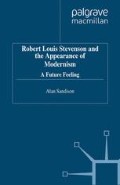Abstract
Leslie Fiedler, commenting on Stevenson’s inclination to play the role of child and to fall in love with older women, says of his marriage to the forty-year-old Fanny van de Grift that ‘there can be little doubt that one of Stevenson’s motives in marrying was to become a child — and finding himself at the age of 30 at long last a child enabled him unexpectedly to become for the first time a real creative writer’.1 Having delivered himself of this assured analysis of Stevenson’s psycho-sexual drives and the nature of the literary imagination, Fiedler doesn’t really attempt any very serious justification. Which is probably just as well since his colourful diagnosis, while it may be winsomely paradoxical, seriously misrepresents Stevenson’s problems with authorship — literary and biological.
Death of the Father would deprive literature of many of its pleasures. If there is no longer a Father, why tell stories? Doesn’t every narrative lead back to Oedipus? Isn’t storytelling always a way of searching for one’s origin, speaking one’s conflicts with the Law, entering into the dialectic of tenderness and hatred?
Roland Barthes, The Pleasure of the Text
‘Who doesn’t desire his father’s death?’
Ivan in Dostoevsky’s The Brothers Karamazov
Access this chapter
Tax calculation will be finalised at checkout
Purchases are for personal use only
Preview
Unable to display preview. Download preview PDF.
Notes
Leslie Fiedler, ‘R. L. S. Revisited’ in No! in Thunder, printed in The Collected Essays of Leslie Fiedler, vol. 1 (New York, 1971), pp. 299–300.
Franz Kafka, Letter to the Father in Wedding Preparations in the Country and other Prose Writings, trans. E. Kaiser and E. Wilkins (1954), pp. 176, 173.
Peter Blos, Son and Father: Before and Beyond the Oedipus Complex (New York, 1985), p. 69. See also Kafka’s letter in Wedding Preparations in the Country…, pp. 176, 178.
Carla Freccero, Father Figures: Genealogy and Narrative Structures in Rabelais (Ithaca, 1991), pp. 6–7.
Sandra M. Gilbert and Susan Gubar, The Madwoman in the Attic (New Haven, 1984), pp. 4–7.
Clement Greenberg, ‘Beginnings of Modernism’ in Modernism: Challenges and Perspectives, ed. Monique Chefdor, Ricardo Quinones and Albert Wachtel (Illinois, 1986 ), p. 19.
Irving Howe, ‘The Idea of the Modern’, in Selected Writings 1950–1990 (New York, 1990), p. 161.
Irving Howe, Decline of the New (New York, 1970), p. 30.
B. Inhelder and Piaget, The Growth of Logical Thinking from Childhood to Adolescence (New York, 1958), p. 337. Quoted in Blos, op. cit., p. 54.
Georges Van Den Abbeele, Travel as Metaphor: From Montaigne to Rousseau (Minneapolis, 1992), pp. 46, 47, 58.
Yevgeny Zamyatin, ‘On Literature, Revolution, Entropy and Other Matters’, in A Soviet Heretic: Essays by Yevgeny Zamyatin, ed. and transi. Mirra Ginsburg (Chicago, 1975), pp. 112, 109, 110.
Harold Bloom, The Anxiety of Influence: A Theory of Poetry (Oxford, 1975), p. 88.
André Bleikasten, ‘Fathers in Faulkner’ in The Fictional Father: Lacanian Readings of the Text, ed. Robert Con Davis (Amherst, 1981), p. 119.
Malcolm Bowie, Freud, Proust and Lacan: Theory and Fiction (Cambridge, 1990), p. 6.
Copyright information
© 1996 Alan Sandison
About this chapter
Cite this chapter
Sandison, A. (1996). A Crisis of Paternity. In: Robert Louis Stevenson and the Appearance of Modernism. Palgrave Macmillan, London. https://doi.org/10.1057/9780230376397_2
Download citation
DOI: https://doi.org/10.1057/9780230376397_2
Publisher Name: Palgrave Macmillan, London
Print ISBN: 978-1-349-39295-7
Online ISBN: 978-0-230-37639-7
eBook Packages: Palgrave Literature & Performing Arts CollectionLiterature, Cultural and Media Studies (R0)

